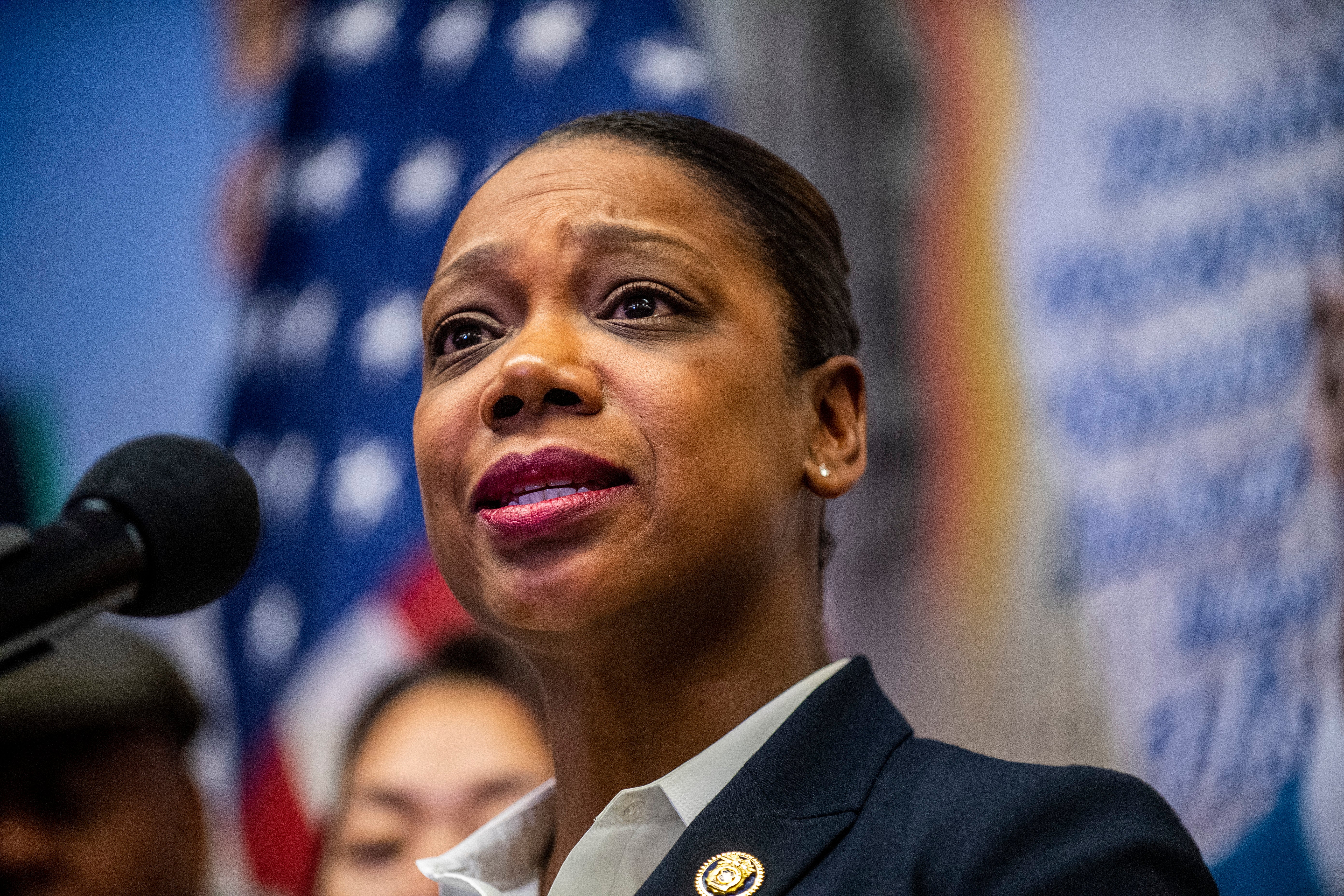New NYPD leader makes history after a strong 1st impression
Keechant Sewell spent her entire policing career in suburban Long Island before recently becoming New York City's first police commissioner from outside the department in over two decades

New York City’s new mayor says he picked Keechant Sewell as the city's first female police commissioner partly because of her poise in handling a mock crisis he threw at her in the interview process.
Within hours of her Jan. 1 swearing-in, Sewell was confronted with a real one: an officer shot outside a police station while sleeping in his car between shifts.
“It was a whirlwind weekend, quite busy,” Sewell, 49, told The Associated Press in one of her first interviews as the leader of the nation's largest police force, a department grappling with a recent rise in violent crime and continued fallout from a reckoning on police misconduct.
Sewell rushed to the hospital where Officer Keith Wagenhauser was in surgery to remove bullet fragments from his head. She told reporters the officer was lucky to be alive. In the mock scenario a few weeks earlier, she’d been asked to hold a news conference about a hypothetical police shooting.
Introducing Sewell as his choice last month, Mayor Eric Adams said the longtime Long Island police official was “calm, collected, confident” and had the “emotional intelligence needed to lead at this challenging and hopeful time in our city.”
“I think leadership prepares you to be able to tackle anything that comes your way,” Sewell told the AP. “I look forward to what I can learn from the NYPD and being able to bring what I already have to the table.”
Sewell’s baptism by fire continued with a Monday briefing at police headquarters on a planned gang takedown the next day — the first big arrest operation of her tenure — and a news conference Tuesday with Adams and the Brooklyn district attorney.
On Thursday, she and Adams were together again, joining Gov. Kathy Hochul to discuss putting more police in the subways. Adams, a former police captain, has given outsize attention to his old department in his first week on the job, accompanying Sewell to events and addressing officers one morning at roll call.
Sewell spent her entire policing career in suburban Nassau County before becoming the NYPD’s first outside leader in more than two decades. She is also the third Black person to lead the department. Sewell said she brings “a fresh perspective” to the job while also acknowledging the department's “incredible sense of tradition.”
Sewell said she spent the weeks leading up to her swearing-in speaking with everyone from street level officers to former top brass. She also named two NYPD veterans as her top deputies: Edward Caban, the new first deputy commissioner and Kenneth Corey, the new chief of department.
Sitting in the NYPD’s Theodore Roosevelt Room, with a bust of the former president and police commissioner to her right and portraits of him lining the walls, Sewell spoke about her priorities and the challenges of policing a city of 8.8 million people.
“First and foremost, I want the city to be safer,” Sewell said. “I want there to be a better quality of life. I want the police department to collaborate with the community, because they’re part of the community.”
Sewell started with the Nassau County Police Department as a patrol officer in 1997, then became a precinct commander, head of major cases, a top hostage negotiator and finally chief of detectives, where she oversaw a staff of about 350 — about 1% the size of the NYPD's unformed ranks.
Adams promised during his campaign to hire a female commissioner, and in hiring Sewell vaulted her to the top of a list of notable women in policing that includes Philadelphia Commissioner Danielle Outlaw and former Seattle Chief Carmen Best. He said Sewell "carried with her throughout her career a sledgehammer, and she crushed every glass ceiling that was put in her way.”
As Sewell was being briefed on the gang takedown Monday, a work crew mounted her portrait next to her predecessors on a wall just at police headquarters. A woman walking by remarked that the addition was “a long time coming.”
Like the men who came before her, Sewell's success will be measured largely in crime statistics and whether she's able to rein in a pandemic-era increase in gun violence and homicides.
After reaching a low of 292 homicides in 2017, the city hit 468 in 2020 and more than 480 last year, the highest number since 2011.
Sewell this week endorsed Adams’ plan to reinstate a plainclothes anti-crime unit that was disbanded amid police misconduct protests in 2020 over concerns that it accounted for a disproportionate number of shootings and complaints. Sewell said this time around the unit will be more responsible and better behaved — an assurance critics view skeptically.
Mark Winston Griffith, of Communities United for Police Reform, said Sewell should abandon “failed policing strategies of the past." He said the new commissioner should also commit to firing police officers who “abuse, harass, brutalize, and kill" and promote transparency by releasing more disciplinary records.
"Fair policing and responsible policing is not mutually exclusive to public safety," Sewell told the AP. “When you have the people who have the temperament, the desire and the training to do these types of things, you get the results that you want. But the community should be a part of that, and they should understand what our role is and what we intend to do to make them safer.”
___
Follow Michael Sisak on Twitter at twitter.com/mikesisak.
Bookmark popover
Removed from bookmarks